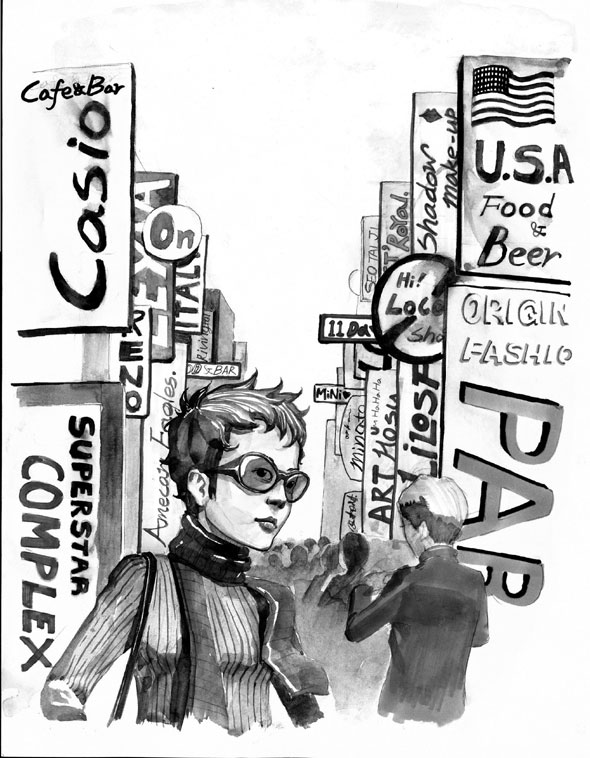Foreign language, where to stand in Korean society?
 | ||
In the new IT (Information Technology) era, foreign languages, especially English, have clouded the Korean language. Consequently, foreign words are used not only in signboards, but also in daily conversations especially among the younger generation. The overflow of foreign languages has been a controversial issue in Korean society for several years without any clear solution in sight. However, with new active movements made by government organizations and the public, the usage of foreign language has once again been questioned. Amidst this argument, now is the time to speculate on the change and future trajectory of foreign language use in Korean society.
Korean and foreign language, side by side
Now in the 21st century, there has been a massive change in the social and cultural contents of Korea. Since industrialization, Koreans have gradually adopted a Western living style, which has actively pervaded throughout the Korean society from the mid 1990s. Koreans have experienced a definite change in their food culture as foreign food chains, including restaurants and cafes, have entered Korea. Thus, eating out is no longer a privilege to most people. Many new restaurants and cafes have foreign names largely because of their origin and public acceptance.
Along with the change in the names of shops, Korean products are now rarely named in Korean. Most distinctively, Korean fashion brands have mostly adopted foreign names such as On & On, TBJ, Litmus and Noton. Likewise, newly released snack products are mostly named after foreign expressions, leaving behind the Korean names to be labeled in the far end corner.
Although many foreign words are deliberately made for certain purposes, some have come into use alongside the inflow of cultural trends, originating from overseas. For example, most recently, the so-called "Well-being" boom has prospered throughout Korea, and accordingly, the word itself has been used as a proper noun. Similarly, due to open Internet access, many Internet words such as e-mail, spam mail, netizen and download are being used among the Korean people. Affected by the social and cultural movement, the usage of foreign words now prevails throughout Korean society at a rapid rate. Consequently, the Korean language is gradually becoming contaminated with uncontrolled foreign language use. In this state, it is inevitable to reflect on the factors that have resulted in this phenomenon.
Reasons for the overuse of foreign language 
The overuse of English words started with the movement of globalization. With cultural and social interaction taking place, English has gained great importance in Korean society. However, many factors have been influential in bringing it to a broader public use.
One of the most effective factors has been the people's perception of English as a symbol of globalization. However, according to Park Yong-chan, Senior Researcher at the National Academy of the Korean Language, English has always changed slightly in phonetic and semantic terms according to the society in which it has adapted to. In the sense that it is different in sound and meaning, the borrowed words could rather hinder the process of accurate English learning, says Park Yong-chan. Thus, as English words in Korea are usually used without a filtering-out system, English expressions are often wrongly used in inappropriate situations. Unvigilant to the overuse of inaccurate words, Korea is nowhere close to globalization.
Likewise, Koreans now tend to thoughtlessly admire English and deride their mother tongue. This is similar to how the Chinese characters were worshipped over the pure Korean language before industrialization. Perceiving it as a gracious and intellectual language, Koreans prefer and excessively use English.
Another problem is the inconsistent attitude of the Korean people. During Japanese colonization, Koreans were forced to use Japanese, leaving behind their own language. After independence, Korea has continuously eradicated Japanese expressions from the Korean language. However, unlike the case of Japanese, many Koreans ignore the possible danger that could arise from the overuse of English.
Moreover, Korean people are simply a bit negligent in changing foreign words into Korean. Many people point out the hardship of translating technical and scientific words into Korean, resulting in new electronic products being imported with their manuals not translated except for conjunctions such as "and" and "but". These manuals sometimes discourage customers, who are willing to comprehend all possible functions that are available.
However, the most influential factor may be the inevitability of the change in a language. According to Prof. Goh Kwang-yoon (Dept. of English Language and Lit.), languages have always affected each other. With the advent of globalization, English has affected the Korean language. The U.S. now has monopolized most of the international markets with its cultural contents. Consequently, Korea is receptive in following the new trends and has naturally adopted the language as well.
With these influences, English has affected the Korean language and now it is hard to cease the use of it. Regardless of reality, many people still question the right or wrong of English use. However, to find a solution for this unsettled argument, the limitations and problems need to be examined beforehand.
Evaluation on the overflow of foreign language
Throughout history, languages have existed as a symbol of a nation's identity and pride in the sense that each morpheme has its distinctive meaning. Historically, English has also been influenced by other languages such as Greek, French and Latin.
While accepting this inevitability, however, the sense of negligence is still to be criticized, says Park Yong-chan. Rather than blaming the difficulties of accurate translation, it is essential to look back on the attitude of the people. Korean people these days tend to complain about the difficulties of translating without giving it a try. Before even thinking of an alternative word in Korean, people tend to put the pen down so easily. Facing nothing but excuses, Korean linguists have expressed their concerns on the deterioration of the Korean language. This is primarily because excessive use of English could possibly lead to the devaluation of the pure and single identity of the Korean language.
According to Park Yong-chan, the widening of the generation gap is a social reason for alleviating the usage of English. The gap occurs because the older generation that is acquainted with the old social trend where political issues were the prime concerns, have trouble learning the new cultural and economic expression used among the younger generation. Consequently, even the news has become an uninteresting TV program for the older generation, as cultural and economic reports prevail over political issues. In the case of Japan, the public has actually experienced a huge generation gap that has drastically led to a hardship in daily communication between the younger and the older generation.
In regard to this fact, two factors need to be met: purity and communal sense. When using foreign languages, if these two qualities are agreed upon, the usage of English will not endanger the identity of the Korean language.
Marking boundary lines to stop the overflow 
France, which is in the same situation as Korea, has recently set up about 50 national institutions where English and other foreign languages have been translated into pure French. However, the new French words are hardly taken into actual usage, because this process is merely done by the linguists and then vertically sent down to the citizens to use without any prior public approval. In consideration of this failure in France, Korea has not yet institutionalized any government organizations. However, organizations such as the National Academy of the Korean Language have started a new program where many people voluntarily participate in translating English words into Korean, says Park Yong-chan. His goal is to ultimately bring the translated words into actual use through this voluntary process.
Another possible solution to this language problem is to do statistical research on the usage of foreign languages in Korea, says Prof. Goh. After the research is done, intrinsic reasons can be examined, conducing a feasible and an ideal solution for the current state.
New invitation
Language is a representative of a country's identity, inevitably changing along with the cultural and social changes. What is important is not the judgment on the righteousness of foreign language use, but the discovery of the most suitable solution that could fit into the current state of Korea. Now that many foreign words are rooted in Korean society, it may be rather awkward to neglect the use of them. However, considering the fact that language stands for more than a means of communication, especially the younger generations, which is the main user of foreign language, must acknowledge the importance of their mother tongue. By showing such respect toward its mother language, the usage of foreign language will not lead to a language deterioration, but rather a harmonious co-existence.

